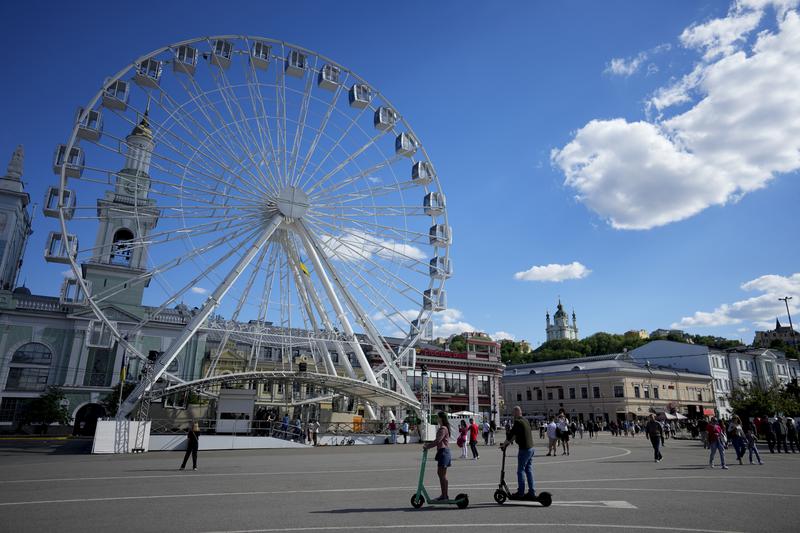David: Masha Gessen is a staff writer for The New Yorker, who was born in Russia and has been covering that nation in its politics for us for years up to and including the war in Ukraine. I reached Masha in Kyiv last week. Masha, it's good to talk to you.
Masha Gessan: It's good to talk to you, David.
David: You've been visiting Kyiv for years and years and now you're there during wartime. The streets of Kyiv are said to be quiet as opposed to so much of the country in the East and in the South. What is daily life in Kyiv now?
Masha Gessen: Daily life Kyiv at first glance is perfectly normal. Cafes are open. Hipsters are in the streets. It's sunny. It's beautiful. Three-four times a day you hear the air raid siren, no one pays it any mind. You dig a little deeper it's obviously not all so peaceful and so wonderful. There's small things that you notice at first if you pay attention. There are very few kids. The women with children who were the bulk of the refugees, they haven't returned. You notice for example that the lines of the gas stations are pretty long. The gas is incredibly expensive.
That shows a completely different light and all these young people shuttling around on electric scooters which are bold is working here, people are renting scooters but part of the reason they're renting scooters is because cabs have come few and far between and private cars are very difficult to use. It's this resumption of civilian life that is so much more difficult than life was just three months ago, even if at first bounce it looks almost exactly the same.
David: Now, you've also been getting out of town. How do things change?
Masha Gessen: Well, just beyond Kyiv there's just unimaginable destruction. It's comparable to what I saw for example in [unintelligible 00:02:04] of Chechnya after the second war. After they'd had 10 years of carpet-bombing. It's just absolutely devastating, but you've seen all those pictures, right? What you don't see unless you're here is how you pass from this totally pristine area where everything seems to be perfectly intact into an area that has been completely devastated.
David: What are you hearing in terms of overheard conversations in cafes, restaurants, the streets?
Masha Gessen: Yes, so what you hear is talk about war. A lot of people, I'm assuming, are getting together for the first time since they came back. You hear a lot of people retelling the story of leaving the city. How they got out, when they got out. It's always some dramatic story depending on what people's circumstances were, but it's always dramatic. Then if they're not talking about that they're talking about what missiles the US is sending, where this battalion should have been posted. The other night there were these two absolutely beautiful women sitting at the table next to me and then they looked supermodels.
They were completely in total full makeup, the way that only Ukrainian women can be in just in utter perfection. Then I hear them say [Ukranian language]. These places that have become synonymous with just horrific war crimes, people talk about war crimes all the time.
David: What are they describing? What are the particular acts?
Masha Gessen: Well, people describe the random murder of civilians. People talk about rape. They talk about being robbed. They talk about being held hostage. They talk about torture. They talk about what's happened to them. They talk about what's happened to their friends and relatives. The scale is just undigestible. It's not something that the national justice system can digest. It's not something that the international justice system can digest, and it's certainly not something that the human mind and heart can digest.
David: When you talk to people in Kyiv, what do they expect is ahead for them?
Masha Gessen: In Kyiv, a lot of people refer to the war in the past tense, and then catch themselves and say, "Well, yes, of course, the war is still going up." It's entered that stage of war that Ukrainians are used to which is war is elsewhere, and you know how to end up at war. It's not the worst, it's not coming at you, or at least not right at this moment. We're about to travel East and South a little bit, and I'm told it's very different in places that are closer to the front. People are afraid to talk to journalists. People are afraid to talk about what happened to them because they're quite convinced that it could happen again.
David: Recently, Henry Kissinger said at Davos that Ukraine would have to reconcile itself to giving up territory in order to find peace with Russia. I can only imagine what the reaction to this was in Kyiv.
Masha Gessen: Look, every Ukrainian understands that when you say territory you're talking about the people who live there. Every Ukrainian understands in gory detail what happens to people in territories occupied by Russia. The very suggestion that you could consign millions or even hundreds of thousands, or even one or two people willingly to the torture, the rape, the want to killing, the humiliation that they have suffered at the hands of the occupiers is just unthinkable.
David: Masha Gessen, thank you, be well and be safe.
Masha Gessen: Thank you, David.
David: Masha Gessen in Kyiv and we spoke last week. You can read Marsha's reporting at newyorker.com.

